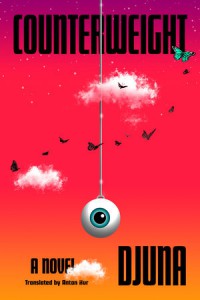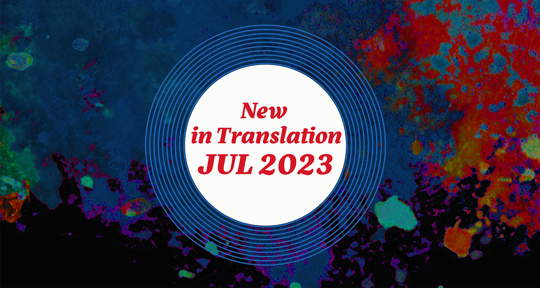This month, we’re excited to introduce two works that explore social intricacies from two respective angles: the familial and the technological. From the Italian, lauded modernist Natalian Ginzburg’s most recent English-language work plumbs into the combustive conflicts within a family unit to reveal the complex moralism within our most intimate relationships. From the Korean, science fiction author Djuna conjures a thrilling tale of how corporate politics and advancement colonises upon human identity. Read on to find out more!

The Road to the City by Natalia Ginzburg, translated from the Italian by Gini Alhadeff, New Directions, 2023
Review by Catherine Xinxin Yu, Assistant Director of Outreach
Seventeen-year-old Delia is a frivolous beauty with neither talent nor sense. Her hobby is to get dolled up in her blue dress, take the dusty road to the city, and stroll around, admiring its affluence. Seeking to escape from the drabness of her townish family, she thought a bright future had beamed on her when a rich doctor’s son began pursuing her, but little did she know that it was an abyss, instead, that beckoned.
The Road to the City is Italian novelist Natalia Ginzburg’s earliest published work, written in 1941 and published in 1942. At the time, she had been sent into internal exile to a village in Abruzzo for her husband’s anti-Fascist activities. Missing her home city of Turin while developing close ties to the locals in Abruzzo, she blended the places and people from memory and real life to craft this nuanced novella, with a snappy style that “[her] mother might like”.
Ginzburg has an incredible talent for depicting explosive clashes within families, integrating insight and humour into her narrative. English readers might already be familiar with her voice through Family Lexicon, her autobiographical novel published in 1963, and in The Road to the City, we see her burgeoning style with same pithy descriptions and wry comedy, surgically precise choice of scenes and voices, refrains of familial sayings as inside jokes and memory triggers, and nuanced character sketches that highlight their contradictions and moral ambiguity. But unlike Ginzburg’s own family, which is soldered with love and a common cause against fascism, The Road to the City traces how a family splinters into pieces from collective shame and spite.
In this tragicomedy about amorous affairs and marriages, fools drown in their own versions of mucky love—a desire to possess without any intention to make the “beloved” happy, or at least less miserable. Much entertainment can be found in the “romantic” scuffles and woes: a cheating wife throwing a tantrum when her lover cheats on her, a breakup in the garden followed by bouts of torment-driven pneumonia, sorrows drowned in fiery grappa, more pneumonia, and nightmares with apparitions of the lost one. These tragic scenes are pitch-perfectly cliché, often making me howl with disgusted laughter at the characters’ irrationality and narcissism.
But beneath the farce lies the real devastation: the predicament of women and the fate of children born into families unready to embrace them. The lack of viable choice for rural women in work, marriage, and childbearing is what makes this book as relevant today as when it was published over eighty years ago. These women are uneducated, compelled to catch a husband to secure financial stability; while men are prizes, women are perishable goods graded by age and appearance, and also exchangeable among friends like gifts.
It is a bitter world awash with misogyny, of men against women, women against women, mothers against daughters, each hurling missiles of age shaming, class shaming, body shaming, slut shaming, and spinster shaming at every female being. And family is not a harbour but a sinking ship where all the members are strapped together, each resenting the others’ weight, especially when there is a fallen woman onboard.
Delia and her sister Azalea despise their mother, not for her ignorance and garrulousness, but for her tired looks after decades of toiling for the family. Delia writes:
I hate the green and bitter soup our mother placed before us every evening and I hate our mother. I would have been ashamed of her if I’d come across her in the city… she looked like a peasant. Her hair was dishevelled and grey, and her front teeth were missing.
The mother in turn hates her children:
My mother said that children are like poison and should never have been born into the world. She spent her days cursing all of her children, one by one.
This rancour is perpetuated by the constraint of women “needing” husbands. At one point, Delia declares to her fiancé:
“I know you no longer care for me, and I no longer care for you. But as for marrying, you have to marry me, because otherwise I’ll throw myself into the river.”
And the vicious cycle returns to curse the younger generation:
It made me sad to have brought that baby into the world, with a chin as long as my mother-in-law’s, a baby who also looked like [my husband], but in no way like me.
Fortunately, Ginzburg tempers such bitterness with levity, finding breathing room in the antics of the mutually despised. For a while, Delia boards with her aunt in a rural town, but she loathes the locals and the stench, the lack of electricity and running water. The aunt, on the other hand, finds city people indecent:
“… always running away to the city ever since she was a little kid, and so she has lost all sense of shame.”
And ridiculous:
“It’s the darkness that’s frightening. It makes me not want to eat. When night falls here it’s like a tomb.”
“Oh poor little thing: you can’t eat unless you have electricity. I hadn’t heard that one yet.”
This blend of laughing (at) and crying with the imperfect victims of a mercilessly misogynist society is perhaps what Ginzburg meant by “not writing accidentally”, as discussed in her afterword. Hers is a mode of writing rooted in personal experiences and imbued with both genuine love and hate towards the people around her, who go on to become characters in her stories.
Gini Alhadeff’s translation perfectly captures the nuances of the story while honing the sharpness of Ginzburg’s minimalist prose—“each sentence like a slap or the lash of a whip”. She also retains some expressions that are refreshingly unfamiliar in English, but are perfectly in tune with the rural southern Italian setting. In a winter scene, Delia is described as being “green as a lemon” by her cousin Santa. Though we tend to think of lemons as yellow fruits, they indeed range from green to yellow-green in the winter, which simultaneously captures Delia’s sickly complexion and Santa’s linguistic habitus. It reflects the same lemon green on the book cover, a semblance of lushness recalling the ingenuous summer sex in the woods, while concealing the acerbic taste of life underneath.
Beneath the cover, this lemon of a book invites one to take a bite, to relish the burn.

Counterweight by Djuna, translated from the Korean by Anton Hur, Pantheon Books, 2023
Review by Heloisa Selles, Executive Assistant
Imagine a balloon that you’ve let go of by mistake, its string getting shorter by the second. In the opposite direction, a caterpillar is making its way down from the treetops through a transparent web. Superimposed, these two images could constitute a vertical highway in miniature—an elevator that could, for example, allow for all that rises and all that falls to meet in the same spot, in some unseen layer of the atmosphere.
In Counterweight, the sci-fi world created by Djuna, space elevators not only exist but are something “both feasible and profitable” for both people on Earth and out in space. The island of Patusan, a run-down nation located at the end of an archipelago near Indonesia, was the chosen spot to become “a gateway to Earth”:
A satellite in geosynchronous orbit dropped a spider cable that began automated work on the elevator long before it touched land. Once it did make landfall, the cable grew thicker and wider and longer and more complex.
As if being fed through an umbilical cord, the island begins to revive: there is a new harbor, an airport, and a huge boom in population, with professionals coming from all over the world to help build space elevators. Once completed, “all kinds of wonderful things will come true, from space travel to global climate control.” But that’s just what the eye can see.
The titular counterweight, then, is the cumbersome contraption that offsets the heft of the elevators, maintaining their structure. Initially, it was composed of the remains of an asteroid previously used for mining, but it eventually grows larger as more trash is sent over. Now “a veritable floating junkyard”, it holds the spider-like cables of the space elevators. Like a true deus ex machina, the machine proposes to solve otherwise irresolvable plots: garbage disposal, unimaginable leaps in technology, and the future of humanity. This device-image also nags at what is right under our noses: what are the counter-balanced forces that keep the world spinning? If we depend so much on technology, does it make it the final frontier? If we collect all the memories that constitute us, all the facts, all the fragments, and add them up—is that it, is that who we are?
In agile, straightforward prose, Djuna weaves a tale that unfurls as vividly as a film. Literary references and bits of humor are sprinkled throughout the whole book, an unexpected and welcome feature. It has the effect of drawing the next chapter in and conducting the reader’s gaze beyond the abyss that forms whenever we scrutinize the evolution of very present, palpable things—artificial intelligence, privacy concerns, transnational corporations, neocolonialism. This peculiar rhythm reminded me of Bong Joon-ho’s The Host, a monster film from 2006, which surprised me by adding unexpected layers to its somewhat simple premise. At that time, Djuna was already writing science fiction and compiling short stories—though they have kept their identity private for over twenty years, a true feat in our commonly curated contemporary landscape. When asked about the future of science fiction in Korea, they said: “I don’t want to try predict it. I just want to accept the unpredictable changes and enjoy the surprises.” The eyeball on the cover, a glazy, unmovable object, further corroborates the author’s approach of omniscience, an Emerson-like transparent eyeball that lets “the currents of the Universal Being circulate through me.” By claiming such power, it feels as if the book is also teaching us how to do the same.
What Djuna seems to be interested in doing is investigating what comes after the waves of optimism and pessimism that oscillate around the never-ending stream of technologies. The narrator, an unreliable but relatable character, gives the tune:
These people will soon realize they’re all puppets of the company AI. Such is the worth of humanity’s free will in the coming era. . . They don’t want their world to change—they want all their boring desires and thrills till the end of time. That’s the immortality they seek. Do I have any right to judge [them] for it?
If AI’s prevalence is a matter of time, perhaps this pragmatism could have an important function. When fiction author William Gibson claimed that “the future is already here, it’s just not evenly distributed”, he suggested that the advent of progress is something independent from human interference, as a passive stream of facts to be witnessed. A depth belies this seeming apathy, however. In Counterweight, there is space for Choi Gangwu, a dissident character “who wouldn’t laser off his beard,” an attitude considered “a bit of pitiful personal rebellion.” Though minute, Choi’s refusal to perfect his appearance might not be the protest we wanted, but it may be the one we need—a personal stance that defies societal expectation on one’s own terms, within one’s own means.
In a publishing landscape where getting an English translation from a Korean book is “like trying to draw blood from stone”, Anton Hur managed to continually bring original texts to the Anglosphere, and do it impeccably well. There is a beauty in exploring a narrative conflict that places the machine side by side next to the man, instead of in opposition: “What did it mean to have briefly been a human body in the long history of these elements that began some hundreds of millions of years ago inside a supernova?”
In the nineteenth century, the Luddites tried to fight the incorporation of machines into the English textile industry. As we all know, it happened anyway. Did they suspect, back then, that certain forms of weaving would remain artisanal, organic, and impossible to copy—such as crochet? Djuna seems to suggest there might be more to science fiction than a battle between humans and machines: “After all, every single thing in the universe had its reason for existing.” Perhaps, that is the best we can hope for.
*****
Read more on the Asymptote blog:

